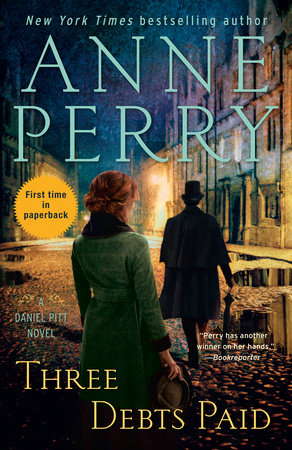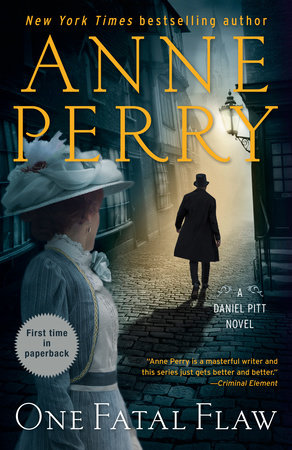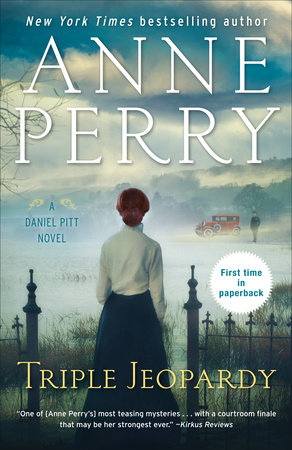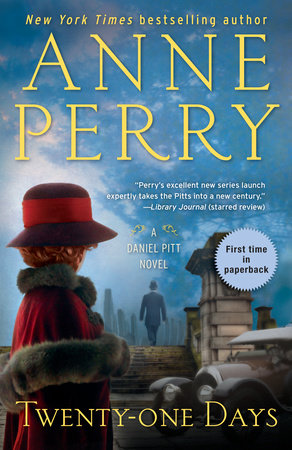Excerpt
The Fourth Enemy
Chapter One Daniel smiled at his wife. “Your father might forget people’s names, if he doesn’t particularly like them, or office meetings entirely, but he’s never late for dinner.” He passed by Miriam and did not even try to resist the desire to touch her, kiss her cheek again, and feel the softness of her hair before leaving to go upstairs to wash and tidy up a little before dinner.
Marriage was still a new and wonderful adventure for him, a happiness so intense he found it hard to accept. He and Miriam had known each other for some time, but they had only realized their relationship went far deeper than friendship, or even collaboration, in the past year. He recalled the end of the last case on which they had both worked and how, as they had stood in the torrential rain in the graveyard, he had finally understood that it was love. Now they were together, and this was rich, new, and infinitely sweet to him.
As expected, Miriam’s father, Marcus fford Croft, arrived exactly on time. He was standing on the doorstep, smiling, when Daniel answered the bell. At this time of year, it was still full daylight at this hour, and Marcus practically glowed in the slanted rays of the evening sun. He was wearing a yellow-gold velvet waistcoat under his light jacket, and his bow tie was a deep bronze. He was smiling with sheer pleasure.
“Come in,” Daniel invited him, standing back so that Marcus could step into the hall.
Once inside, Marcus paused for a moment, looking at the paintings Miriam had brought from his house, where she had lived all her life. It clearly pleased him to see her old childhood possessions here in her new home. It was a sign that she felt this was now where she belonged.
Miriam came out of the kitchen and greeted Marcus. She hugged him quickly, met his eyes for a moment, then turned and led him into the sitting room, where she poured him a glass of sherry. They kept it especially for him, knowing how much he enjoyed it. The doctor had said that one glass was acceptable, but since Marcus’s first heart attack, not more than one—and definitely none of the much stronger brandy he preferred.
Miriam brooked no argument. She loved her father deeply. Her mother had died long ago, leaving the two of them behind. But Miriam was strict about him obeying orders where his health was concerned. It was the only issue on which she always prevailed.
Marcus settled in his chair comfortably, glancing at his daughter and then back again at Daniel.
Daniel could see that he had something to say. It was there in the way he sat, a certain tension in his shoulders.
It was Miriam who broke through the pleasantries. “You have news.” It was a statement. “Tell us, before dinner spoils,” she said with a smile. “Don’t put my cooking to the test. Please.” It was a sincere request.
While she had lived in her father’s house, she had never concerned herself with any domestic tasks at all, including preparing meals. All her time and passion had gone into her study of pathology. Daniel had learned by trial and error what to say regarding her culinary skills and what to leave unsaid. But Marcus had never learned, nor, indeed, had he tried to. But then, Miriam would take a lot of criticism from her father because they adored each another, and she was secure in his acceptance of her eccentricities, as he was secure in her acceptance of his.
Daniel was still discovering how easily he could hurt her, sometimes without realizing it until it was too late. She was older by fifteen years, and his admiration for her was immense, but admiration was quite different from love. Their marriage was new, exciting, frightening, and comfortable, all at the same time. It touched emotions he had not known before.
“I have news for you, yes,” Marcus said, breaking what had been a few moments of silence. He was smiling, as if he was anticipating their surprise . . . and pleasure.
Miriam inhaled, as if preparing to speak, then apparently changed her mind.
Marcus said, “I have decided to retire. I think perhaps, finally, it is time.”
Miriam drew in another sharp and audible breath, but Daniel saw that it was out of relief, not apprehension. She was only too aware of the danger of another, more serious heart attack—perhaps fatal this time. After the first one, she had come home from Holland, interrupting her studies, and she had not gone back until her father was out of immediate danger, regardless of the lectures she was missing and the exams awaiting her.
Daniel looked at her and saw her shoulders relax.
Whatever might happen to the chambers of fford Croft and Gibson without her father’s leadership, Miriam regarded it as secondary to his health. She was smiling now. She glanced only briefly at Daniel, then back again at Marcus.
“Good!” she said firmly. “They will have to learn to manage without you. And you must let the new head of the chambers—whoever he turns out to be—take the lead.” She smiled, as if to soften the words. “You must not lean over his shoulder and second-guess his actions. Let him make the important decisions, as if you have complete confidence in him. He will not do everything as you would, but that is not necessarily a bad thing. He must be allowed to have his own ideas, or he will not be much use.”
Daniel knew that she meant every word; she was looking at her father sternly, despite the gentleness in her face. He knew, too, that she was thinking not only about Marcus, but also about whoever would be taking on the extremely difficult task of following the brilliant, erratic, and eccentric man who had led the chambers since its inception. There had never been a Gibson. The name had been added to bolster public confidence, so people would think there was more than one man at the helm.
There were undoubtedly several extremely competent barristers, some of them well established. Daniel could not think who Marcus would choose to succeed him. Toby Kitteridge, Daniel’s closest friend in the chambers, was extremely able; he was far cleverer at the law than he realized, and he was very good in court, but he had a long way to go to develop the assurance required to lead. Maybe one day Daniel would become head of chambers, but not for ten or fifteen years at the very least—and possibly not ever. His chief ability was leading in court, as well as carrying out the detective work usually done by one of the solicitors. It was an area of expertise in which he hoped to become known.
Daniel was watching Miriam, who seemed to be waiting for her father to go on. Instead, Marcus turned to Daniel, a flicker of uncertainty in his eyes. Surely he was not going to ask for Daniel’s opinion? That would be absurd. Daniel had been with the chambers for no more than a couple of years. Marcus might not ask his opinion regarding his successor, but perhaps he would want his support for whatever decision he was going to make. No one would be particularly surprised by his choice, with several very skilled men in the chambers, but they might be disconcerted. At the same time, his staff would be relieved. Marcus’s health was of paramount concern to all of them.
Whomever Marcus appointed, it would be a big change. And it would be a hard job at first, no matter who took over.
The silence dragged on too long.
“Who are you going to choose?” Miriam asked. “Have you decided yet? Or are you asking Daniel’s view?”
“Or yours?” Marcus said, his smile now a little less certain. “Neither, as it happens. I have thought about it long and hard, and I have already decided. Although it is too late for you to disapprove, I value your opinion, and your love even more. But I will not change my mind.” He took a deep breath. “You may, of course, disagree with my choice. But it is a fait accompli. And—he has accepted.”
Daniel glanced at Miriam’s hand resting on the arm of the chair and saw that her knuckles were white. He let out his breath very slowly.
“And who is he?” he asked. “Do we know him?”
“The new man?” Marcus raised his eyebrows.
“The new head of chambers.” Daniel was wrong-footed. Surely Marcus was not bringing in an outsider to lead them?
Without answering, Marcus said quietly, “Well, we need a new barrister also. You are good, Daniel, but we need a King’s Counsel, a silk! To make a splash. You will do that one day, but you are not ready for it yet.”
“Then who?” Miriam demanded, her face tense. “Who have you invited in as King’s Counsel?”
“Oh, you will know of him,” Marcus replied. He was smiling, his voice slightly husky, as if his mouth were dry. “Gideon Hunter KC. He has been second at Mitchell Dawson for years, but he will never be a member of the family—and they are a family chambers, and a trifle stuffy. I found he was looking for something more . . . more adventurous.” He smiled again, seeing the tension in their faces. “We will suit him excellently.”










